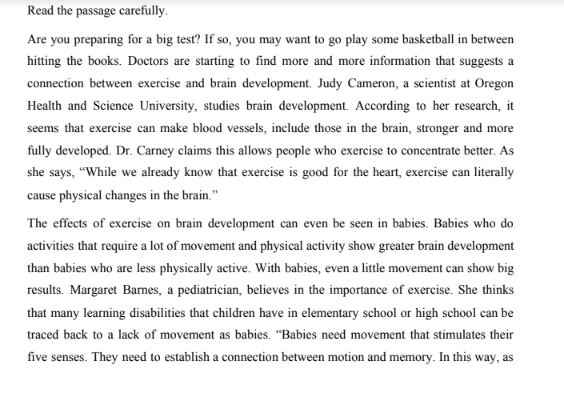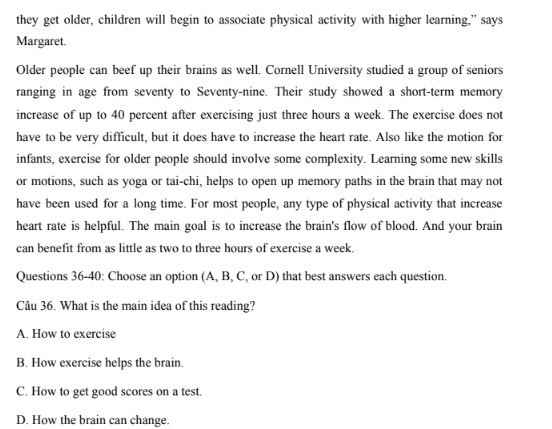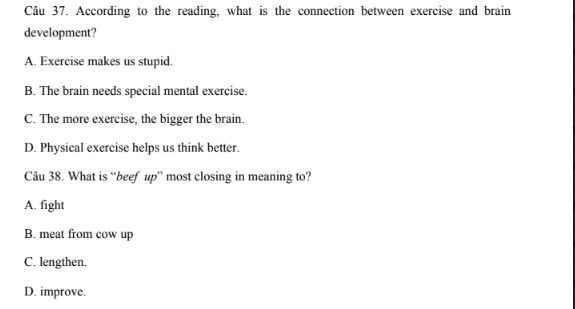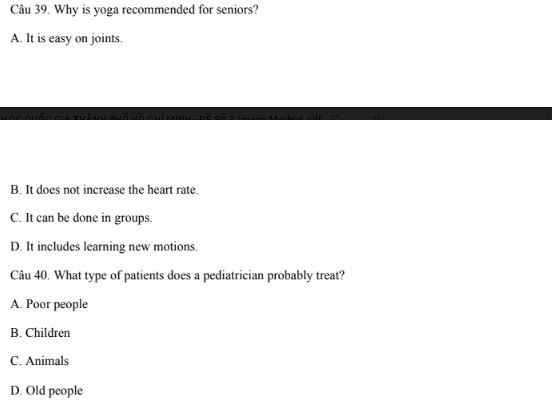Vế trước là quá khứ->vế sau quá khứ nối
I đi với was
Vậy chọn đáp án A. was
Vế trước là quá khứ->vế sau quá khứ nối
I đi với was
Vậy chọn đáp án A. was
CHUỖI SERIES CÂU HỎI ĐỀ LUYỆN THI ĐGNL ĐHQG TPHCM
[MÔN TIẾNG ANH NGÀY 4]




A. Choose A, B, C or D to fill in each of the corresponding gaps. Babies sleep for up to eighteen hours a (26)................................... Mrs. Thatcher and Napoleon both said they only (27).................................. to do it three or four hours a night. Sleep. No one can live without it. But how much do we really need? Research by the National Sleep Foundation (28).................................. Washington says that we all need eight hours’ sleep every night. Scientists have found that people (29).................................... sleep for less than six and a half hours a night are more often ill (30).................................. people who sleep for eight hours. Going without sleep also increases the chance of serious illness. ‘Workaholics’ who sleep (31).................................. less than five hours often die young, and do worse at work. The scientists found that on average adults (32).............................. for seven hours a night, with thirty-two percent sleeping less than six hours. It also (33).......................... that the idea that we need less sleep as we get older is completely untrue. ‘People have (34)............................. idea how important is to their lives’ Dr. Thomas Roth, director of the Foundation says. ‘Good (35)............................. needs good sleep’. 26. A. day B. week C. month D. year 27. A. need B. needs C. needed D. needing 28. A. at B. in C. on D. under 29. A. what B. which C. who D. where 30. A. than B. as C. of D. for 31. A. of B. for C. with D. at 32. A. to sleep B. slept C. sleeping D. sleep 33. A. to say B. say C. says D. saying 34. A. not B. no C. none D. nor 35. A. health B. healthy C. healthful D. healthily
B. Find and correct the mistakes in the following sentences 23. She has started learning to drive two weeks ago. 24. Unless she will study hard, she will fail the exam. 25. She felt tired but she went to bed earlier than usual.
A. Choose A, B, C or D to fill in each of the corresponding gaps. Babies sleep for up to eighteen hours a (26)................................... Mrs. Thatcher and Napoleon both said they only (27).................................. to do it three or four hours a night. Sleep. No one can live without it. But how much do we really need? Research by the National Sleep Foundation (28).................................. Washington says that we all need eight hours’ sleep every night. Scientists have found that people (29).................................... sleep for less than six and a half hours a night are more often ill (30).................................. people who sleep for eight hours. Going without sleep also increases the chance of serious illness. ‘Workaholics’ who sleep (31).................................. less than five hours often die young, and do worse at work. The scientists found that on average adults (32).............................. for seven hours a night, with thirty-two percent sleeping less than six hours. It also (33).......................... that the idea that we need less sleep as we get older is completely untrue. ‘People have (34)............................. idea how important is to their lives’ Dr. Thomas Roth, director of the Foundation says. ‘Good (35)............................. needs good sleep’.
Viết một đoạn văn ngắn từ 5-7 câu bằng Tiếng Anh nói về một người nghệ sĩ mà bạn hâm mộ.
Mark the letter A,B , C or D on your answers sheet to indicate the world that differs from the orther three in the position of primary stress in each of the following questions A. pharmacy B. reviewer C. resident D. interview
We go ………… the wall to see flowers
A. through
B. along
C. past
D. in
Computer programmer David Jones earns £35,000 a year by designing new computer games, yet he cannot find a bank prepared to let him have a cheque card. Instead, he has been told to wait another two years, until he is 18. The 16-year-old works for a small firm in Liverpool, where the problem of most young people of his age is finding a job. David's firm releases two new games for the expanding home computer market each month. But David's biggest headache is what to do with his money.
In spite of his salary, earned by inventing new programs within tight schedules, with bonus payments and profit-sharing, he cannot drive a car, take out a mortgage, or obtain credit cards. He lives with his parents in their council house in Liverpool, where his father is a bus driver. His company has to pay £150 a month in taxi fares to get him the five miles to work and back every day because David cannot drive. David got his job with the Liverpool-based company four months ago, a year after leaving school with six O-levels and working for a time in a computer shop. "I got the job because the people who run the firm knew I had already written some programs." he said. "I suppose £35,000 sounds a lot but actually that's being pessimistic. I hope it will come to more than that this year”. He spends some of his money on records and clothes, and gives his mother £20 a week. But most his spare time is spent working.
"Unfortunately, computing was not part of our studies at school," he said. "But I had been studying it in books and magazines for four years in my spare time. I knew what I wanted to do and never considered staying on at school”. Most people in this business are fairly young, anyway. David added: "I would like to earn a million and I suppose early retirement is a possibility. You never know when the market might disappear."
Question 1. How does David earn money?
A. by working as a taxi driver
B. by selling new programs
C. by designing new computer games
D. by running a small firm
Question 2. Why is David different from other young people at his age?
A. He earns an extremely high salary.
B. He is not unemployed.
C. He does not go out much.
D. He lives at home with his parents.
Question 3. David's greatest problem is_________.
A. making the banks treat him as an adult
B. inventing computer games
C. spending his salary
D. learning to drive
Question 4. He was employed by the company because__________
A. he had worked in a computer shop.
B. he had written some computer programs.
C. he works very hard.
D. he had learnt to use computers at school.
Question 5. He left school after taking O-levels because_____________
A. he did not enjoy school.
B. he wanted to work with computers and staying at school did not help him.
C. he was afraid of getting too old to start computing.
D. he wanted to earn a lot of money.
Question 6. Why does David think he might retire early?
A. You have to be young to write computer programs.
B. He wants to stop working when he is a millionaire.
C. He thinks computer games might not always sell so well.
D. He thinks his firm might go bankrupt.
Question 7. The word "it" in paragraph 2 refers to_________________________
A. computing
B. producing
C. teaching
D. introducing
Tìm lỗi sai và sửa lại cho đúng:
1. I think that(A) we should come up with(B) a new(C) innovation(D) for doing this job.
2. The carpenter joined(A) the two (B) beams together(C) with(D) long nails.
A food chain is the way energy goes from one living thing to another through food. Plants are the first (16) _______ in most food chains. Plants use the energy in sunlight to make their own food. Plants store the energy in their leaves and stems. Plants are called primary producers in food chains. Animals eat the plants (17) _______ use the Sun's energy to grow. Animals are called (18) _______. Animals that eat plants are primary consumers. Animals that eat other animals are secondary consumers. Animals store the energy in their bodies. Energy flows (19) _______ plants and bigger animals through the steps of eating and being eaten. Each part of the food chain is directly connected to the other, just (20) _______ the links in a chain.
16. A. step B. foot C. run D. leg
17. A. when B. what C. that D. then
18. A. buyers B. shoppers C. sellers D. consumers
19. A. in B. from C. for D. till
20. A. as B. alike C. similar D. like